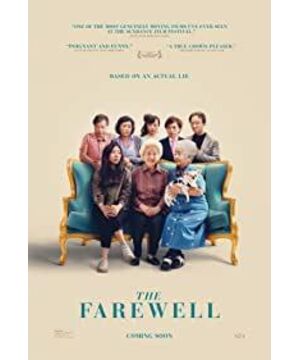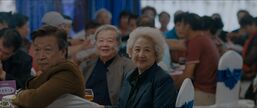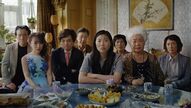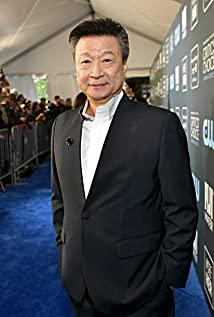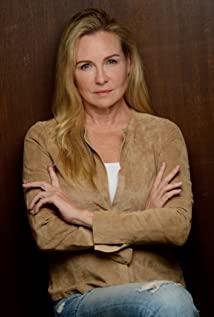Original: https://www.vox.com/2019/7/16/20687739/lulu-wang-farewell-interview-identity
Author: Alissa Wilkinson
Translator: Xiao Shuang
Translation address: https://cinephilia.net/72255/
Wang Ziyi almost didn't make her second feature film "Don't Tell Her", which was a hotly debated film at the Sundance Film Festival in January this year. This family drama revolves around a Chinese-American woman Billi and her grandmother (played by Zhao Shuzhen). The heroine Billi is played by the rapper and actor Awkwafina. She has contributed a good performance in it. When grandma was diagnosed with advanced lung cancer and was told that there were only three months left to live, the whole family chose not to tell grandma according to traditional Chinese practices. Instead, they planned a hurried wedding for Billi's cousin in China, so that all relatives could have a reason to come back to see grandma for the last time. They are saying goodbye to grandma, but grandma herself has no idea.
Wang Ziyi's own grandmother was indeed diagnosed with advanced lung cancer, and all his family members gathered together in a similar way, so Wang Ziyi decided to make a movie for this. But it is too difficult to find investors for such a story. After all, it is a literary family drama about Chinese-American women, and the story takes place in China, and it is almost all dialogue in Chinese.
I met Wang Ziyi in New York and talked to her about why it is so difficult to find investment in this film, how she insisted on filming the story she wanted to shoot, and also talked about family topics, such as in certain places. Memories of experience, and the feeling of leaving the water like a fish.
Note: There are spoilers ahead!
Alissa Wilkinson (hereinafter referred to as AW):
"Don't Tell Her" is a story about how the family mixes truth and lies, but it is also a movie that adds some fictional plots to the story that happened to you. How does it feel to change such a private story into a movie?
Wang Ziyi (hereinafter referred to as Wang):
I am a director, so when I encountered this in real life, I immediately thought it was a very good story, but I always have to think more about the work experience training in Hollywood: "Then how can I adapt it? Sell this story and make this story what the producers want?"
I started looking for people to talk about the idea of the movie, and I always got the same question: "Is this an American movie or a Chinese movie?" I think it's like asking me, "Is it an American or a Chinese?" To this question I will answer them: "I am an American, I grew up in the United States, I speak English, and my views are very American."
But for the last question, I will answer: "I want the most realistic performance, so I want Chinese actors and Chinese-American actors." I want the people in the film to speak the language they should have spoken, because that will highlight me The difference between being an American and them, for example, sometimes I cannot communicate with my Chinese family, and the geographical distance between me and them.
But then the questioner would say: "Well, that means this is an American movie. In that case, there will be no market at all." No way, I can only continue to find Chinese investors. One investor said: " Yes, I think this is a Chinese film, but then the protagonist cannot be Billi, but must be more like a Chinese character, because Chinese audiences cannot resonate with Chinese Americans like Billi." I said: "This Impossible! Because I am Billi!"
So I knew there was no way to make a movie according to my wishes. If that was the case, it would not be worth it. Maybe there will be a chance to tell the story in other ways in the future, so I wrote the story in the form of a short story. Came down, very early version.
Then I met a producer, Neil Drumming, producer of the TV series "This American Life". He watched a short film of mine at the film festival and said, "What else do you have? Stories you want to shoot but no one invests in making you make them? Give them all to us.” Then I gave him the short story, and they immediately selected it as an episode of the podcast. It took a month to rewrite and record. , And finally aired on the podcast. We also interviewed my family, a very pure experience, which gave me the opportunity to truly understand my own feelings.
I think, okay, it seems I am right. Hollywood is not suitable for me, because this kind of story is what I want to tell, and I can no longer be a director, because movies are not suitable for presenting the stories I want to tell.
Of course, two days after the story aired on the podcast, a producer called and said that they wanted to make the story into a movie. At that time, I felt that I had the right to negotiate with the producer: Unless you agree to make this film in my way, I will not make it. Chris Weitz, the producer who came to me at first, and Big Beach, the production company that later invested in me, both responded to me: "Relax, we have always been guided by the director's wishes. We hope you have what you want to shoot."
So in the end, they all supported me very much and fully supported me in making the movie I wanted to make.
AW:
I think a major feature of Hollywood movies that are generally produced is that they have a wide audience. The producers want to broaden the audience as much as possible so that they can recover the initial investment as much as possible. The consequence is that the movie does not feel like anyone’s real experience. , But it seems that the audience really likes this type of narrative.
King:
It is true. I want to tell a family story about grandma, daughter, mother, and father. I don’t want to make an "Asian film", just like a white male director did not want to make a "white film." They just tell their family stories from their own perspective, and the same is true for me.
From many perspectives, it is a very American way to think about a person’s identity on the surface. For example, if you are a person of color, you have to tell a story about identity and a story based on your appearance, because This is what you are in the eyes of mainstream society, and they can only see the surface.
And for me, yes, this movie is about identity, but it's more about what happens when you leave your hometown. What kind of values did you take away from your hometown, and what values did you leave behind? What kind of concept would you choose? These things are much deeper than the color of your skin and what you look like.
This is also a story like a fish out of water. A person who is not blond is in an Asian country. She has yellow skin and black hair like the locals. Everyone expects you to be like them, but in fact, you are not like them. Same. In the world we live in now, I actually think everyone can feel the same way. After all, who would feel that their looks exactly match their inner thoughts?
AW:
The movie itself is really like a fish leaving the water. From the beginning, there was a mixture of two languages, even the credits. In certain segments of the movie, people will comment on each other’s accents. Of course, I don’t understand the difference in accents at all, but some audiences who understand it will notice this. The movie just keeps me watching and accepting situations where I can’t understand or understand. You know that you are an outsider and you can only feel the tension.
King:
That's it, I want to show that Billi is comfortable in most situations until she finds out about her grandma's condition. Before that, she was an ordinary American girl, chatting and laughing with her friends.
But we will all go home. How many people do not feel at home or even feel that they are part of the family when they come home on Thanksgiving or Christmas? Especially in large families, with so many relatives that you don’t know well, you may just be told that that person is your aunt, but you don’t think you two are related. Even whites living in New York, born and raised in the United States, still have a lot of time for them to feel like a fish out of water, in an uncomfortable environment. I think that kind of feeling is the same all over the world, the kind of feeling that doesn't belong to the local area.
I don't want to explain things to the audience too bluntly in the movie, just want them to be immersed in this experience. So in the early test screenings, sometimes we would ask the audience "Do you know who this character is? What is her relationship in the family?" Some audience members would say "I don't know, I was confused." But some audience members Will say: "I can't figure it out, but I think it's okay."
Every time I go to China, I sometimes don’t know what’s going on. When I go back to my hometown, I don’t know who my relatives are. When I go to a Chinese wedding, I feel like "It’s not like the wedding I’ve been to. Is it really a wedding?" Is that the reception desk? That's... well, I guess this is really a wedding." When you go to that environment to perceive and understand, you can naturally learn.
I want the audience to have a similar experience. In fact, if the audience asks a lot of questions, they are not sure what it is. If they try to figure it out, it will make them more involved. If the audience knows all this in advance There would be no such immersive experience.
AW:
I think this is one of the reasons why I admire this film so much. It’s not like the kind of film that wants to cater to the audience and explain everything clearly. It respects me and trusts me. understand.
But it’s also very interesting. The film obviously takes place in China, and it’s also about Chinese people, but it can’t run for the Oscar for Best Foreign Language Film (now known as the Oscar for Best International Feature Film), which makes me think about it. What is a "foreign language" film.
King:
Yes, most of them are in Chinese, but it's definitely not a Chinese movie, just from Billi's point of view. Did you know that everyone at our distributor A24 and the production company Big Beach is asking the same question: Is this a "foreign language" film at all? Is this a good thing or a bad thing for us? I think this is what makes this movie interesting: we are opening up a vast new world.
This is completely different from the film "Rome", which is a completely "foreign language film" because it is a Mexican film, a film made by director Alfonso Cuarón as a Mexican. He grew up in Mexico and now returns to Mexico to shoot "Rome". But "Don't Tell Her" is completely different.
So it was a great decision to show "Don't Tell Her" in the American feature film campaign unit of the Sundance Film Festival instead of the foreign language unit. We can see what happens and how the audience reacts.
AW:
Yes, it’s interesting that another film that stood out from the Sundance Film Festival is "Souvenir" (The Souvenir), which was screened in the foreign language film campaign. It is a British film, but the whole film is In English, this subverts the audience's traditional concept of "foreign language films".
King:
Indeed, it has also subverted the audience's traditional concept of "American films".
AW:
Yes. Another important clue in your movie is the passage of time. Changchun is where Billi has childhood memories, but obviously this place has changed dramatically.
I know that some shooting scenes in the film are related to you in real life. When you go back to your hometown, did you experience the experience of perceiving the passage of time like Billi? Did you have a similar experience when you went back to your hometown and when you went back to shoot again?
King:
Yes, it's almost like looking in the mirror. If you look in the mirror every day, you won't notice any difference, but if someone you haven't seen for a long time sees you again, you will notice the changes in you. In China, I go back once every few years, but I have hardly been back before. Every time I go back, I feel that I can't recognize my hometown at all. Sometimes I feel that New York is the same.
AW:
I feel so too.
King:
You will find: "Oh my God, why did you open a gym again? It's still a chain. Wasn't there a small store before?"
AW:
Sometimes when I pass a street corner or an old store, memories of other places, times, and people suddenly pop up, but they are no longer as familiar as they used to be. The corner and the old store always change, but the memories are like ghosts. The same entangled me.
King:
It is true, and then you will try to grasp something familiar. A few days ago I passed by a restaurant with indoor and outdoor spaces, and I was thinking: "Hey, isn't this a bar?" Because I was drunk in that bar once, that night It's beautiful, but I can't find that bar now!
My memory of China is even more exaggerated than this, because I spent my childhood there when I was a child, so I have a lot of nostalgic love for home, so I often look for: "Where is my grandma's house? Where is the garden? Where is the apple tree?"
But I'm not sure what exactly exists, and what just exists in my imagination. In my memory, these huge sunflowers are taller than me. They are full of sunflower seeds, and I can eat them all. But now, I am an adult. Although both houses and sunflower seeds exist, I feel "Oh my God, it turns out to be so small!" Because I was too small when I was a kid, everything looks big, but it's just normal. The size of the sunflower. But the memory cannot be changed, because everything is over.
AW:
Yes, your body still remembers that place, but that place has changed, so you feel at a loss as to what to do. How many scenes in the movie are related to you in real life?
King:
We shot in the neighborhood of my grandma's house. Those orange buildings are the neighborhood of my grandma's house. Then there are two coincidences. One is that we searched around for a cemetery suitable for shooting but couldn’t find it. I didn’t want the photographer to be limited by reality. I said, “We still have to find the best cemetery suitable for shooting. Anyway, the audience can’t tell which ones are real. Which ones are not, after all, we have already come to Changchun to shoot, this is enough!"
But in the end we chose my grandfather's cemetery to shoot, because theoretically we couldn't get the consent of others to shoot their cemetery, so we chose my grandfather's real cemetery.
The scene was very moving and meaningful. I was standing in front of my grandfather's grave with the entire filming team. I haven't seen my grandfather again since I was six years old. I left China at that time. My grandpa wants to be a writer. This is his dream, but it has never been realized. Some of his friends and other relatives of me will tell me that I am continuing my grandpa's dream.
Then the wedding hall was the real place where my cousin got married in real life. Their wedding was in that hotel, the same wedding hall, but different rooms. He held the wedding banquet in a smaller room. We shot in a larger room, but the same wedding hall.
AW:
When you look at those scenes, you will add a lot of extra layers of memory.
King:
Yes.
AW:
Has your family seen this movie?
King:
My parents watched it on Sundance and they were very proud of me. When my father read the script, he thought "very real, but I didn't know you would actually make this into a movie. Would anyone care about this story? How could someone give you money for you to make it?" For him , This is just daily life.
The same is true of my aunt, who starred herself in the film. At first she thought, "Yes, I decided not to let your grandma know her true condition. That's how it happened. You made a movie? You want me to act? My face is too fat, I'm just an ordinary person. , And I’m not an actor, why should I act? I’m definitely not acting well, and I’m not a star!” So in order to prove that she can really become a movie star, and to prove that this family story is worth filming, figure out that they themselves are How you think about it, how you think about the value of our unique story, is very meaningful.
AW:
Is grandma still alive?
King:
Still alive.
AW:
Will she go to watch this film then?
King:
I don’t know. We got the distribution rights in China. My aunt was participating in the premiere in New York today. Before I was asking her what we were going to do, she said, "Let’s tell you grandma, the movies are all fictitious, none of them Really, Ziyi made it up by himself!"
View more about The Farewell reviews


